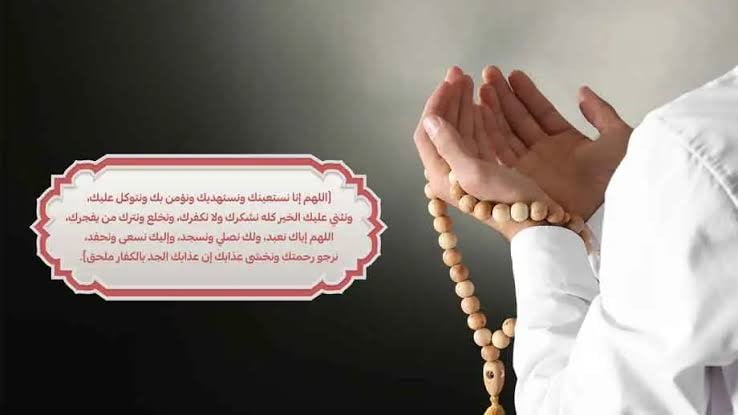What is Qunoot?
The meaning of Qunoot is piety or devotion. It has multiple linguistic meanings and one of them is “To stand”.
Dua e Qunoot
Dua e Qunoot can be understood as Dua for piety. And it is one way to extend our devotion to Allah SWT and ask for His Mercy at the time of affliction. It is a kind of act that shows our gratification to our Lord and that we obey only and only Allah and to Him only we ask.
Dua for Qunoot (oftenly read in Witr prayer) in Arabic:
اَللَّهُمَّ إنا نَسْتَعِينُكَ وَنَسْتَغْفِرُكَ وَنُؤْمِنُ بِكَ وَنَتَوَكَّلُ عَلَيْكَ وَنُثْنِئْ عَلَيْكَ الخَيْرَ وَنَشْكُرُكَ وَلَا نَكْفُرُكَ وَنَخْلَعُ وَنَتْرُكُ مَنْ ئَّفْجُرُكَ اَللَّهُمَّ إِيَّاكَ نَعْبُدُ وَلَكَ نُصَلِّئ وَنَسْجُدُ وَإِلَيْكَ نَسْعأئ وَنَحْفِدُ وَنَرْجُو رَحْمَتَكَ وَنَخْشآئ عَذَابَكَ إِنَّ عَذَابَكَ بِالكُفَّارِ مُلْحَقٌ
Its Transliteration
Allah humma inna nasta-eenoka wa nastaghfiruka wa nu’minu bika wa natawakkalu alaika wa nusni alaikal khair, wa nashkuruka wala nakfuruka wa nakhla-oo wa natruku mai yafjuruka, Allah humma iyyaka na’budu wa laka nusalli wa nasjud wa ilaika nas aaa wa nahfizu wa narju rahma taka wa nakhshaa azaabaka inna azaabaka bil kuffari mulhik
Meaning
O Allah! We implore You for help and beg forgiveness of You and believe in You and rely on You and extol You and we are thankful to You and are not ungrateful to You and we alienate and forsake those who disobey You. O Allah! You alone do we worship and for You do we pray and prostrate and we betake to please You and present ourselves for the service in Your cause and we hope for Your mercy and fear Your chastisement. Undoubtedly, Your torment is going to overtake infidels O Allah! (At-Tirmidhi: 464, Abu Dawud: 1425)
Dua for Qunoot Rotibah in Arabic:
اللهُمَّ اهْدِنِي فِيمَنْ هَدَيْتَ
وَعَافِني فِيمَنْ عَافَيْتَ
وَتَوَلَّنِي فِيمَنْ تَوَلَّيْتَ
وَبَارِكْ لِي فِيماَ أَعْطَيْتَ
وَقِنِي شَرَّ مَا قَضَيْتَ
فَإنَّكَ تَقْضِي وَلاَ يُقْضَى عَلَيْكَ
وَإِنَّهُ لاَ يَذِلُّ مَنْ وَالَيْتَ
وَلاَ يَعِزُّ مَنْ عَادَيْتَ
تَبَارَكْتَ رَبَّنَا وَتَعَالَيْتَ
فَلَكَ الْحَمْدٌ عَلى ما قَضَيتَ وَأَسْتَغْفِرُكَ وَأََتُوبُ إِلَيْكَ
وَصلَّى اللهُ عَلىَ سَيًّدًنَا مُحَمَّدٍ النَّبِيِّ الأُمِّيِ وَعَلَى آلِهِ وَصَحْبِهِ أَجْمَعِينَ
Its Transliteration
Allāhummah-dinī fīman hadait
Wa ‘āfinī fīman ‘āfait
Wa tawallanī fīman tawallait
Wa bārik lī fīmā a’atoit
Wa qinī syarra mā qadhait
Fa-innaka taqdī wa lā yuqdho ‘alaik
Wa innahu laa yazillu man wālait
Wa lā ya’izzu man ‘ādait
Tabārakta Rabbana wa ta’ālait
Falak-al-hamdu ‘alā mā qadhaita, wa astaghfiruka wa atūbu ilaik
Wa sallallāhu ‘alā sayyidinā Muhammadin Nabiyyil ummīyi wa ‘alā ālihi wa sahbihi ajma’īn
Meaning of Dua for Qunoot
O Allah, guide me with those whom You have guided and grant me wellbeing with those whom You have granted wellbeing. Take me to Your care with those whom You have taken to Your care. Bless me in what You have given me. Protect me from the evil You have ordained.
Surely, You hold the command and are not commanded, and none whom You have committed to Your care shall be humiliated. And none whom You have taken as an enemy shall taste glory. You are blessed, Our Lord, and Exalted. All I praise is upon You for what You decide.
I seek Your forgiveness and I repent unto You. Peace and blessings be upon our Prophet Muhammad and upon his family and all his Companions.
Dua for Qunoot Nazilah that can be recited at times of any difficulty.
In Arabic:
اللهُمَّ اهْدِنَا فِيمَنْ هَدَيْتَ
وَعَافِنَا فِيمَنْ عَافَيْتَ
وَتَوَلَّنَا فِيمَنْ تَوَلَّيْتَ
وَبَارِكْ لَنَا فِيماَ أَعْطَيْتَ
وَقِنَا شَرَّ مَا قَضَيْتَ
فَإنَّكَ تَقْضِي وَلاَ يُقْضَى عَلَيْكَ
وَإِنَّهُ لاَ يَذِلُّ مَنْ وَالَيْتَ
وَلاَ يَعِزُّ مَنْ عَادَيْتَ
تَبَارَكْتَ رَبَّنَا وَتَعَالَيْتَ
فَلَكَ الْحَمْدٌ عَلى ما قَضَيتَ وَنَسْتَغْفِرُكَ وَنَتُوبُ إِلَيْكَ
اللهُمَّ إِنَّا نَعُوذُ بِكَ مِنْ جهْدِ الْبلاء وَدَرْكِ الشِّقَاءِ، وَسُوءِ الْقَضَاءِ، وَشَمَاتَةِ الأَعْدَاءِ
اللهُمَّ إِنَّا نَعُوذُ بكَ مِنْ زَوَالِ نِعْمَتِكَ، وَ َتَحَوُّلِ عَافِيَتِكَ، وَفُجَاءَةِ نِقْمَتِكَ، وَجَمِيعِ سَخَطِكَ
اللهُمَّ ادْفَعْ عَنَّا البَلاَءِ وَالوَبَاءِ وَالزَّلاَزِلَ وَالمِحَنِ، مَا ظَهَرَ مِنْهَا وَمَا بَطَنَ، عَنْ بَلَدِنَا خَاصَّة، وَسَائِرِ الْبُلْدَانِ عَامَّةً
اللهُمَّ اكْتُب السَّلاَمَةَ وَالعَافِيَةَ لَنَا وَلِجَمِيعِ الْبُلْدَانِ عَامَّةً يَارَبَّ العَالمينَ
اللهُمَّ انْصُرِ الْمُسْتَضْعَفِينَ فِي كُلِّ مَكَان، يَا أَرْحَمَ الرَّاحِمِينَ
رَبَّنَا آتِنَا فِي الدُّنْيَا حَسَنَةً، وَفِي الآخِرَةِ حَسَنَةً، وَقِنَا عَذَابَ النَّارِ. وَصَلَّى اللهُ عَلىَ سَيِّدِنَا مُحَمَّدٍ وَعَلَى آلِهِ وَصَحْبِهِ وَسَلَّم
Arabic transliteration of Dua for Qunoot Nazilah;
Allāhummah dinā fīman hadait
Wa ‘āfinā fīman ‘āfait
Wa tawallanā fīman tawallait
Wa bārik lānā fīma a’atoit
Wa qinā syarra mā qadhait
Fa-innaka taqdī wa lā yuqdho ‘alaik
Wa innahu lā yazillu man wālait
Wa lā ya’izzu man ‘ādait
Tabārakta Rabbanā wa ta’alait
Falak-al hamdu ‘alā mā qadhait, wa nastaghfiruka wa natūbu ilaik
Allāhumma innā na’uzubika min jahdil-balā’, wa darkish-shiqā’, wa sūi’l-qadhā’, wa shamātatil-a’dā’.
Allāhumma innā na’ūzubika min zawāli n’imatik, wa tahawwuli ‘āfiyatik, wa fujā-ati niqmatik, wa jamī’i sakhatik
Allāhumma-idfa’ ‘annal-balā’ wal-wabā’ waz-zalāzila wal-mihan, ma zhohara minhā wa mā baton, ‘an baladinā khāssah, wa sā-iril buldāni ‘āmmah
Allāhumma-ktubis-salāmata wal-‘āfiyata lanā wa li jami’il-buldāni ‘āmmah. Ya Rabbal-‘ālamīn
Allāhumman-suril-mustadh’afīna fī kulli makān. Ya Arhama-rrāhimin
Rabbanā ātina fid-dunya hasanah, wa fil-ākhirati hasanah, wa qina ‘azaban-nār. Wa salallāhu ‘alā sayyidinā Muhammad wa ‘alā ālihi wa sahbihi wa sallam.
Meaning of Dua for Qunoot Nazilah:
O Allah, guide me with those whom You have guided and grant me wellbeing with those whom You have granted wellbeing. Take me to Your care with those whom You have taken to Your care. Bless me in what You have given me. Protect me from the evil You have ordained.
Surely, You hold the command and are not commanded, and none whom You have committed to Your care shall be humiliated. And none whom You have taken as an enemy shall taste glory. You are blessed, Our Lord and Exalted. All I praise is upon You for what You decide. I seek Your forgiveness and I repent unto You.
Oh Allah, I seek refuge in You from the distress of trial, from the lowest level of misery, from the perversity of fate, and from the malicious rejoicing of enemies.
O Allah, I seek refuge in You from the withdrawal of Your blessing and the change of Your protection (from me) and from the sudden wrath of You, and from every displeasure of You.
O Allah, lift from us the calamity, the pandemic, the disasters, and the tribulations, which are apparent and that which are hidden, especially from our country and other countries (around the world).
O Allah, grant us and other countries (around the world) safety and well-being.
O Allah, grant victory to the oppressed in all places.
Our Lord, give us in this world (that which is) good and in the Hereafter (that which is) good and protect us from the punishment of the Fire. And Peace and blessings upon our Prophet Muhammad and upon his family and all his Companions.
Dua for Qunoot and its importance
Our beloved Prophet Muhammad (PBUH) recited Dua for Qunoot at the affliction and hard times he (pbuh) encountered during his early stage of prophethood in Makkah. He recited Dua for Qunoot at the time of Fajr, Witr, and other prayers (sometimes).
Hence, we must all learn Dua for Qunoot and supplicate to Allah with it and follow the Sunnah.
Almuhammadi Academy teaches you many Duas that are beneficial for all time Dhikr or at the time of hardship.
There are two kinds of Dua for Qunoot.
Dua Qunoot Rotibah or regular and Dua Qunoot Nazilah.
Importance of Dua for Qunoot Rotibah
It is the regular form of Dua for Qunoot that a believer can recite in Witr prayer. It was also the practice of our beloved Prophet Muhammad (PBUH). Hence, we should definitely Dua e Qunoot for Witr and recite it in the Witr prayers. In case you miss reciting it, you can perform Sujud Sahw before the salam.
Importance of Dua for Qunoot Nazilah
This form of Dua is really special. It is specially recited during any calamity or affliction to gain Allah’s Mercy and protection. It can be read during obligatory prayers and also Friday prayers.
Translation of Dua Qunoot and its Transliteration

Benefits of Dua for Qunoot
There are many benefits of reciting Dua for Qunoot:
- It makes us near to Allah SWT.
Allah has said in Surah Al-Baqarah verse 186:
And when My servants ask you, (O Muhammad), concerning Me – indeed I am near. I respond to the invocation of the supplicant when he calls upon Me. So let them respond to Me (by obedience) and believe in Me that they may be (rightly) guided.
- It shows our devotion and obedience towards Allah SWT
- It helps us in following the Sunnah.
- It is one of the best forms of Supplications.
- It is a part of Dhikr and Azkar and makes us able to attain Allah’s blessings and Mercy.
- It is a way to overcome all our problems and difficulties in life.
- It beautifies our prayers and makes us gain khushoo in our prayers.
Almuhammadi Academy is one of the best platforms to learn Dua for Qunoot along with the Quran recitation with Tajweed, Memorization, Arabic language, Hadith and Sunnah, and other Islamic studies at the comfort of your home.
“And He answers [the supplication of] those who have believed and done righteous deeds and increases [for] them from His bounty. But the disbelievers will have a severe punishment.” ( Ash-Shura 42: Verse 26)
Why Dua a Qanoot is important in Prayers?
Supplications or Dua are one of the core elements of our faith. It is so because when we supplicate or make Dua to Allah SWT, we indulge in His remembrance, ask Him for His divine blessings and bounties, and express our belief in Him and His Supremacy. And how Merciful is our Lord, that He answers all our supplications.
Sometimes the answer comes that fulfills our desire and wants and other times, we get rewarded the best of what Allah has kept for us.
Indeed, humans are figures of errors. Hence, when we think that our supplications are not answered, we must know that Allah has answered them and made us have the best which cannot be comprehended by our minds.


